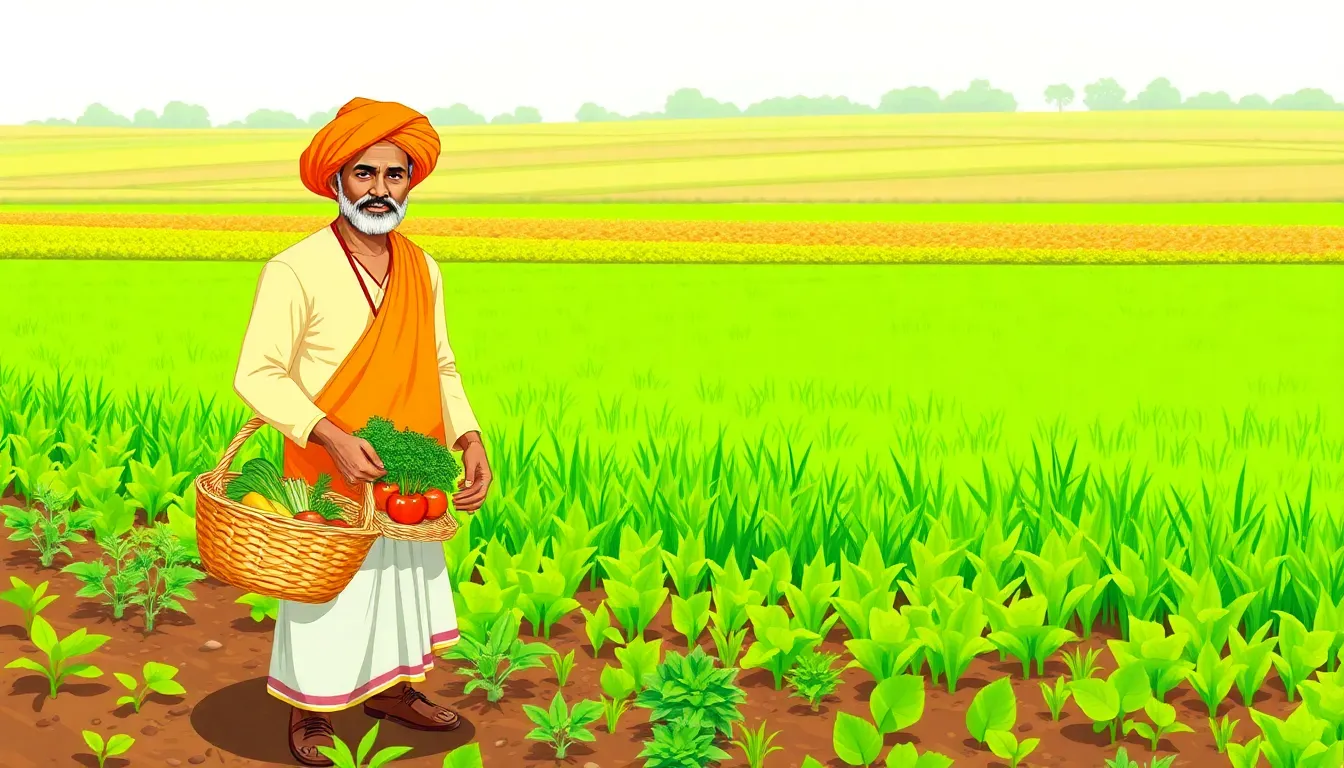The Best Fluffy Pancakes recipe you will fall in love with. Full of tips and tricks to help you make the best pancakes.

In a land where spices dance on tongues and curry reigns supreme, organic farming in India is sprouting like a well-watered seed. Picture this: vibrant fields bursting with life, farmers embracing nature’s wisdom, and consumers craving fresh produce that doesn’t come with a side of pesticides. It’s not just a trend; it’s a revolution that’s turning the agricultural world upside down.
Organic Farming In India
Organic farming in India has gained momentum, reflecting a shift toward sustainable agricultural practices and consumer preferences for healthier options. This transformation supports biodiversity and soil health while addressing food security.
Definition And Principles
Organic farming emphasizes the use of natural processes and materials to cultivate crops. Farmers rely on crop rotation, green manure, and composting to enhance soil fertility. Avoiding synthetic pesticides and fertilizers, this approach reduces environmental pollution. Organic farming also values biodiversity, promoting a balanced ecosystem that benefits both agriculture and wildlife.
Historical Background
Historically, organic farming traces back thousands of years to traditional agricultural practices. Prior to the advent of chemical fertilizers in the 20th century, farmers relied on organic methods. India saw a notable resurgence in organic farming during the 1990s, fueled by rising awareness of health and environmental issues. By 2003, the Indian government recognized organic farming, launching initiatives to promote its adoption among farmers. Today, India ranks among the top countries for organic cultivation, showcasing a diverse range of products from fruits to grains.
Benefits Of Organic Farming

Organic farming in India offers numerous benefits that resonate with environmental sustainability and health improvements.
Environmental Impact
Organic farming enhances biodiversity and soil health significantly. Practices like crop rotation and composting foster nutrient-rich soil, which boosts crop yield naturally. Reduced reliance on synthetic pesticides leads to less chemical runoff, improving local water quality. Farmers adopting organic methods contribute to the preservation of local ecosystems, creating habitats for beneficial insects and wildlife. The absence of harmful chemicals ensures cleaner air and promotes a healthier environment. As a result, organic farming mitigates climate change impacts, aiding in carbon sequestration through healthy soil practices.
Health Advantages
Consumers benefit from organic farming through access to fresher, pesticide-free produce. Nutritional value tends to be higher in organic fruits and vegetables, providing more vitamins and minerals. Research indicates that organic options contain lower levels of heavy metals and pesticides, which reduces health risks. Eating organic food supports immune system function and can decrease allergies in some individuals. Additionally, organic farming practices create a more humane environment for livestock, enhancing the quality of animal products like milk and meat. In essence, organic farming promotes a healthier lifestyle, emphasizing quality over quantity in food production.
Challenges Faced By Organic Farmers
Organic farmers in India encounter several significant challenges that impede their growth and productivity.
Financial Constraints
Financial limits pose one of the biggest hurdles for organic farmers. Many struggle to secure funding due to the high costs associated with organic certification and inputs. Without financial support, farmers face difficulties in transitioning from conventional practices. Limited access to credit makes it tough for them to invest in organic seeds and sustainable technologies. Furthermore, the return on investment may take time to materialize, discouraging potential adopters. As a result, many smallholders find themselves at a disadvantage compared to larger, conventional farms with more resources.
Market Access Issues
Market access continues to challenge organic farmers in India. They often encounter barriers when trying to reach larger markets or cooperate with distributors who focus on conventional produce. Limited awareness among consumers about organic benefits can reduce demand for their products. Additionally, farmers face competition from cheaper, non-organic options that flood the markets, making it harder to compete on price. Establishing a robust supply chain often proves difficult, restricting opportunities for consistent revenue. Despite these challenges, many farmers are working towards innovative solutions to improve their market position.
Government Policies And Support
Government support plays a crucial role in the growth of organic farming in India. Various initiatives promote sustainable agricultural practices and enhance farmer welfare.
Initiatives Promoting Organic Farming
The National Programme for Organic Production (NPOP) sets quality standards for organic products. This program facilitates organic certification, assuring consumers of product authenticity. Additionally, the Paramparagat Krishi Vikas Yojana offers financial assistance to farmers transitioning to organic practices. Collaborative efforts between the government and NGOs also provide training and resources. These initiatives encourage farmer participation while fostering a vibrant organic sector.
Subsidies And Financial Aid
Subsidies significantly lower the financial burden for farmers entering organic farming. The government provides direct grants for organic certification and certifications fees. Furthermore, the National Horticulture Mission supports organic horticulture, offering prior assistance to farmers. Low-interest loans from agricultural banks further facilitate expansion into organic practices. Financial aid ensures a smoother transition, allowing farmers to invest confidently in sustainable farming methods.
Future Prospects Of Organic Farming In India
Organic farming in India is set to flourish further, driven by increasing consumer demand for sustainable produce, government support, and growing awareness of health benefits. The future of this sector appears promising as more farmers turn to organic methods.
Growth Trends
The organic farming sector in India has experienced significant growth, with a 22% annual increase from 2013 to 2020. Approximately 2.8 million hectares of land are now under organic cultivation, home to over 1.5 million farmers. Market trends indicate a rising demand for organic produce, projected to reach $10 billion by 2025. Expanding exports of organic products, particularly to Europe and the US, further underscore this growth potential. These developments showcase a shift toward sustainable agricultural practices that elevate the profile of Indian organic products.
Sustainable Practices
Sustainable farming methods are gaining traction among Indian farmers, emphasizing natural soil enhancement, crop diversification, and biodiversity conservation. Techniques like crop rotation, intercropping, and organic composting significantly improve soil fertility while maintaining ecosystem balance. Farmers increasingly adopt practices that conserve water, enhance soil health, and reduce reliance on synthetic inputs. The potential for agroforestry and integrated farming systems further enriches organic cultivation, offering diversified income streams for farmers. As education and training initiatives proliferate, the adoption of sustainable practices is expected to escalate, contributing to a resilient agricultural landscape.
Conclusion
The organic farming movement in India represents a transformative shift towards sustainable agriculture. As farmers embrace eco-friendly practices and consumers demand healthier options, the landscape is evolving rapidly. With government support and increasing awareness of environmental and health benefits, organic farming is set to flourish.
Despite facing challenges, such as financial constraints and market access, the resilience of Indian farmers is commendable. Their commitment to sustainable practices not only enhances biodiversity but also contributes to food security. As the sector continues to grow, it promises a brighter future for both agriculture and public health in India.
